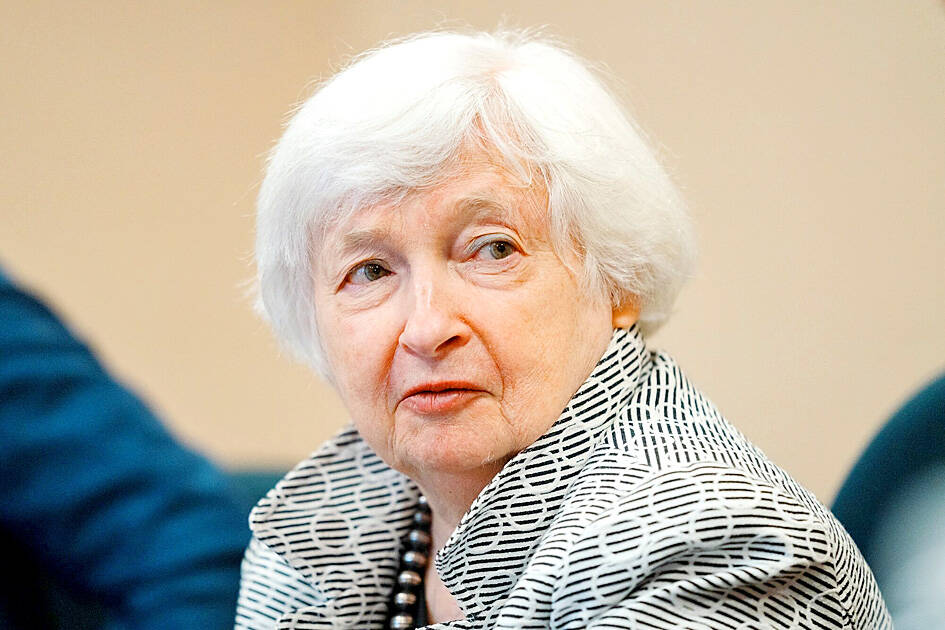US Secretary of the Treasury Janet Yellen said there are no “red lights flashing” for the financial system, and reiterated her view that the US economy has reached a soft landing even as job growth weakens.
“For the US, the kinds of metrics that we would monitor that would summarize risks — whether it’s asset valuations or a good degree of leverage — things look good, I don’t see red lights flashing,” Yellen said on Saturday at the Texas Tribune Festival.
“I’m attentive to downside risks” on employment, she said, adding that job growth is solid.

Photo: Bloomberg
The Treasury chief spoke a day after US equities capped the biggest weekly selloff since the regional banking crisis in March last year — roiled by a weaker-than-expected gain in payrolls that stoked concern that the US Federal Reserve would prove late to begin lowering interest rates.
The S&P 500 Index slid more than 4 percent last week.
“While there are risks, it really has been amazing to be able to get inflation down as meaningfully as we have” while maintaining strong growth, Yellen said. “This is what most people would call a soft landing.”
Yellen highlighted “wages going up at a decent clip,” surpassing the pace of inflation, along with the lack of any mass layoffs. Monthly job gains are at about the level needed to absorb new entrants to the labor market, she said.
Last month’s jobs release showed US hiring fell short of forecasts, with non-farm payrolls rising 142,000. The three-month average hit the lowest since mid-2020, but the unemployment rate edged down to 4.2 percent, Bureau of Labor Statistics data showed. That was the first decline in five months, reflecting a reversal in temporary layoffs.
Yellen also said she would welcome a visit to the US by Chinese Vice Premier He Lifeng (何立峰) and is open to another visit of her own to China, as she underscored the importance of the world’s two largest economies engaging with each other.
“I certainly may go back there — I would welcome a visit by my Chinese counterpart, and my guess is that we will have one way or another a visit,” she said.
Yellen met for hours with He during a visit to Beijing in April, continuing the re-engagement between the two nations that began in November last year with US President Joe Biden’s sit-down with Chinese President Xi Jinping (習近平).

UNCERTAINTY: Innolux activated a stringent supply chain management mechanism, as it did during the COVID-19 pandemic, to ensure optimal inventory levels for customers Flat-panel display makers AUO Corp (友達) and Innolux Corp (群創) yesterday said that about 12 to 20 percent of their display business is at risk of potential US tariffs and that they would relocate production or shipment destinations to mitigate the levies’ effects. US tariffs would have a direct impact of US$200 million on AUO’s revenue, company chairman Paul Peng (彭雙浪) told reporters on the sidelines of the Touch Taiwan trade show in Taipei yesterday. That would make up about 12 percent of the company’s overall revenue. To cope with the tariff uncertainty, AUO plans to allocate its production to manufacturing facilities in

Taiwan will prioritize the development of silicon photonics by taking advantage of its strength in the semiconductor industry to build another shield to protect the local economy, National Development Council (NDC) Minister Paul Liu (劉鏡清) said yesterday. Speaking at a meeting of the legislature’s Economics Committee, Liu said Taiwan already has the artificial intelligence (AI) industry as a shield, after the semiconductor industry, to safeguard the country, and is looking at new unique fields to build more economic shields. While Taiwan will further strengthen its existing shields, over the longer term, the country is determined to focus on such potential segments as

Chizuko Kimura has become the first female sushi chef in the world to win a Michelin star, fulfilling a promise she made to her dying husband to continue his legacy. The 54-year-old Japanese chef regained the Michelin star her late husband, Shunei Kimura, won three years ago for their Sushi Shunei restaurant in Paris. For Shunei Kimura, the star was a dream come true. However, the joy was short-lived. He died from cancer just three months later in June 2022. He was 65. The following year, the restaurant in the heart of Montmartre lost its star rating. Chizuko Kimura insisted that the new star is still down

While China’s leaders use their economic and political might to fight US President Donald Trump’s trade war “to the end,” its army of social media soldiers are embarking on a more humorous campaign online. Trump’s tariff blitz has seen Washington and Beijing impose eye-watering duties on imports from the other, fanning a standoff between the economic superpowers that has sparked global recession fears and sent markets into a tailspin. Trump says his policy is a response to years of being “ripped off” by other countries and aims to bring manufacturing to the US, forcing companies to employ US workers. However, China’s online warriors